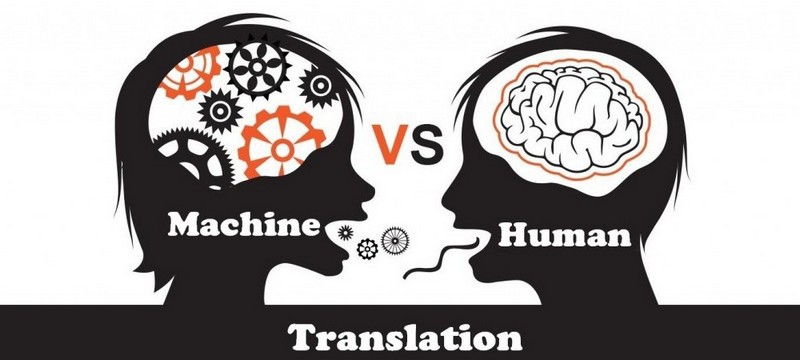The advantages of human translation over Google Translate
By the 24th anniversary of Independence of Ukraine, Internet users actively began to correct the translation of the phrase “Revolutionary Gidnost” in the popular Google Translate online translation service .

With the development of computer and online translators, generally known simply as machine translation, it is no longer difficult to translate words, documents, or even entire websites from one language to another. Although simplicity does not make such a translation option the most effective and convenient. Most languages do not stand still, but develop, change over time, which cannot be taken into account by means of machine translation, where strict rules are used instead of objective judgment, and only examples are used instead of professional expertise.
How machine translation works
')
To understand how machine translation works, you can use the example of the most common and frequently used online translator Google Translate . Like most online tools, Google Translate works using the so-called Statistical Machine Translation principle, which is based on downloading data from the Internet, organizing them and as a result produces the best translation, in the opinion of the system itself, in any desired language pair. This principle, based on statistical data, crashed on Google Translate and led to the fact that the phrase “revolutionism” (Ukr.) Was translated until recently as a “political crisis in Ukraine”:

Such a translation was the result of the publication of identical material in Ukrainian and Russian by ill-wishers with incorrect translation in advance, which suggests that machine translation is easy to circle around your finger.
Human translation
The history of living translators began long before the invention of computers. People who speak foreign languages edited and translated royal decrees and messages from the time of Caesar's rule, when it was necessary to bring information about the new laws of the Roman emperor to people of the seized lands, who often spoke other languages, which sometimes required more than one translator. Over time, social bridges were built between the cultures of different nations, which required deep knowledge of not only cultures and histories of different nations, but also, first of all, foreign languages.
The benefits of human translation
• Qualified language expertise
A living specialist, translating any text, can adapt the turns of speech of one language to analogs of another, which often in a literal translation have a completely different meaning. A human translator is able to convey the tone, structure of speech, style and all the nuances of the source language when translated without losing not only the meaning, but even the idioms and phraseological units in the language.
• Knowledge of the topic
Understanding technological or legal documents can sometimes be a real test for us, even in our native language, and even more so through machine translation from another language. Only a live translator can possess the necessary skills to translate such specialized texts. Thus, only a specialist can provide accurate material transfer, observing all the details and nuances of the translation of terms. With machine translation, the situation is much more complicated and such translation can lead to the fact that the final translation will be radically different and serious distorted perception of the final material may arise.
• Creativity
Computer and online translation services lack the ingenuity of the text conversion process, so machine translation can be extremely literal. A living translator will always be able to choose the most suitable translation, based not only on experience and knowledge, but also on the sensations of the language, and, as we know, machines have not yet learned to feel the machines.
• Cultural perception
The language of any nation is closely related to its culture and social norms. During the translation into their native language, the linguist will be able to adapt the text to its cultural peculiarity and even to the target audience, using different styles of speech. Text elements that may sound excessively, roughly or even offensively in a translation can be modified in the way that only a live translator can do.

Thus, only a living language specialist has a clear understanding and perception of the peculiarities of the language, the subject of the text and the cultural environment for which the translation is performed. Only with the help of human translation can you use all the flexibility, beauty and richness of each individual language when translating. Just as a computer can never write an excellent musical symphony or create an invention of art, machine translation can never completely replace a live linguist.
Read the Polyglot blog →

With the development of computer and online translators, generally known simply as machine translation, it is no longer difficult to translate words, documents, or even entire websites from one language to another. Although simplicity does not make such a translation option the most effective and convenient. Most languages do not stand still, but develop, change over time, which cannot be taken into account by means of machine translation, where strict rules are used instead of objective judgment, and only examples are used instead of professional expertise.
How machine translation works
')
To understand how machine translation works, you can use the example of the most common and frequently used online translator Google Translate . Like most online tools, Google Translate works using the so-called Statistical Machine Translation principle, which is based on downloading data from the Internet, organizing them and as a result produces the best translation, in the opinion of the system itself, in any desired language pair. This principle, based on statistical data, crashed on Google Translate and led to the fact that the phrase “revolutionism” (Ukr.) Was translated until recently as a “political crisis in Ukraine”:

Such a translation was the result of the publication of identical material in Ukrainian and Russian by ill-wishers with incorrect translation in advance, which suggests that machine translation is easy to circle around your finger.
Human translation
The history of living translators began long before the invention of computers. People who speak foreign languages edited and translated royal decrees and messages from the time of Caesar's rule, when it was necessary to bring information about the new laws of the Roman emperor to people of the seized lands, who often spoke other languages, which sometimes required more than one translator. Over time, social bridges were built between the cultures of different nations, which required deep knowledge of not only cultures and histories of different nations, but also, first of all, foreign languages.
The benefits of human translation
• Qualified language expertise
A living specialist, translating any text, can adapt the turns of speech of one language to analogs of another, which often in a literal translation have a completely different meaning. A human translator is able to convey the tone, structure of speech, style and all the nuances of the source language when translated without losing not only the meaning, but even the idioms and phraseological units in the language.
• Knowledge of the topic
Understanding technological or legal documents can sometimes be a real test for us, even in our native language, and even more so through machine translation from another language. Only a live translator can possess the necessary skills to translate such specialized texts. Thus, only a specialist can provide accurate material transfer, observing all the details and nuances of the translation of terms. With machine translation, the situation is much more complicated and such translation can lead to the fact that the final translation will be radically different and serious distorted perception of the final material may arise.
• Creativity
Computer and online translation services lack the ingenuity of the text conversion process, so machine translation can be extremely literal. A living translator will always be able to choose the most suitable translation, based not only on experience and knowledge, but also on the sensations of the language, and, as we know, machines have not yet learned to feel the machines.
• Cultural perception
The language of any nation is closely related to its culture and social norms. During the translation into their native language, the linguist will be able to adapt the text to its cultural peculiarity and even to the target audience, using different styles of speech. Text elements that may sound excessively, roughly or even offensively in a translation can be modified in the way that only a live translator can do.

Thus, only a living language specialist has a clear understanding and perception of the peculiarities of the language, the subject of the text and the cultural environment for which the translation is performed. Only with the help of human translation can you use all the flexibility, beauty and richness of each individual language when translating. Just as a computer can never write an excellent musical symphony or create an invention of art, machine translation can never completely replace a live linguist.
Read the Polyglot blog →
Source: https://habr.com/ru/post/293954/
All Articles